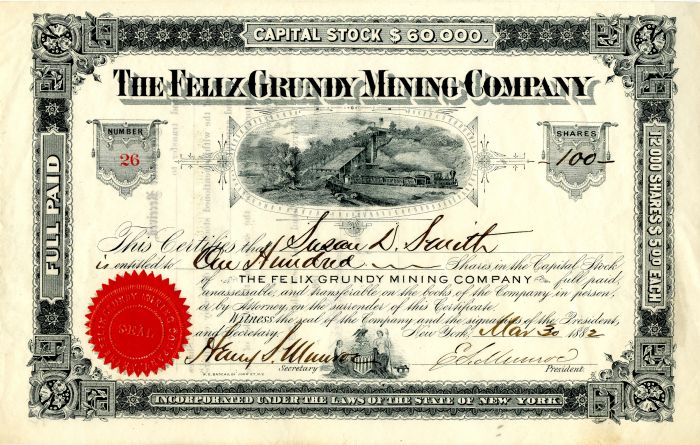Felix Grundy Mining Co. - Stock Certificate
Inv# MS3053 Stock
Stock printed by W.E. Badeau, N.Y. Mines quite possibly in Kentucky? Rare! Choice!

Felix Grundy (September 11, 1777 – December 19, 1840) was a congressman and senator from Tennessee and served as the 13th Attorney General of the United States.
In 1799, he was chosen to represent Washington County at the convention that drafted the second Kentucky Constitution. From 1800 to 1802, he represented Washington County in the Kentucky House of Representatives. He then moved to Nelson County, which he represented in the Kentucky House from 1804 to 1806. On December 10, 1806, he was commissioned an associate justice of the Kentucky Court of Appeals. He was elevated to Chief Justice of the court on April 11, 1807. Later that year, he resigned and moved to Nashville, Tennessee, where he again took up the practice of law. Grundy's decision was in part made due to his opposition to rising Kentucky politician (and later founder of the Whig Party), Henry Clay, whose Bluegrass intrests clashed with Grundy's and made the two rivals, and Grundy left partly due to Henry Clay's growing presence in the state.
He was elected as a Democratic-Republican to the 12th and 13th Congresses and served from March 4, 1811, until his resignation in July 1814.
He then became a member of the Tennessee House of Representatives from 1819 to 1825, and in 1820 was commissioner to settle the boundary line (state line) between Tennessee and Kentucky. He was elected as a Jacksonian in 1829 to the United States Senate to fill the vacancy in the term ending March 4, 1833, caused by the resignation of John H. Eaton to join the Cabinet of President Andrew Jackson; reelected in 1832 and served from October 19, 1829, to July 4, 1838, when he resigned to accept a Cabinet position. During this time he served as chairman of the U.S. Senate Committee on Post Offices and Post Roads (21st through 24th Congresses), U.S. Senate Committee on the Judiciary (24th and 25th Congresses).
He entered the Cabinet when he was appointed Attorney General of the United States by President Martin Van Buren in July 1838. He resigned the post in December 1839, having been elected as a Democrat to the United States Senate on November 19, 1839, to fill the vacancy in the term commencing March 4, 1839, caused by the resignation of Ephraim Foster; the question of his eligibility to election as Senator while holding the office of Attorney General of the United States having been raised, he resigned on December 14, 1839, and was reelected to the Senate the same day, serving from December 14, 1839, until his death in Nashville, a little over a year later. During this stint in the upper house of the U.S. Congress he served as chairman of the U.S. Senate Committee on Revolutionary Claims in the 26th Congress.
A stock certificate is issued by businesses, usually companies. A stock is part of the permanent finance of a business. Normally, they are never repaid, and the investor can recover his/her money only by selling to another investor. Most stocks, or also called shares, earn dividends, at the business's discretion, depending on how well it has traded. A stockholder or shareholder is a part-owner of the business that issued the stock certificates.










Ebay ID: labarre_galleries